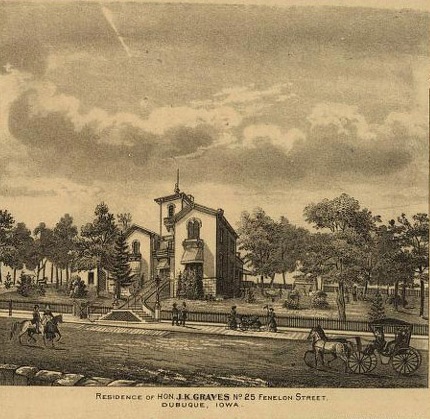Encyclopedia Dubuque
"Encyclopedia Dubuque is the online authority for all things Dubuque, written by the people who know the city best.”
Marshall Cohen—researcher and producer, CNN
Affiliated with the Local History Network of the State Historical Society of Iowa, and the Iowa Museum Association.
GRAVES, Julius K.: Difference between revisions
No edit summary |
No edit summary |
||
| Line 1: | Line 1: | ||
[[Image:graves.gif|left|thumb|250px|Julius K. Graves]] | [[Image:graves.gif|left|thumb|250px|Julius K. Graves]] | ||
[[Image:graveshouse.jpg|right|thumb|250px|Graves home at 25 Fenelon Street]]GRAVES, Julius K. (Keene, NH, Sept. 29, 1837--Dubuque, IA, Dec. 9, 1898). Capitalist. Prominent in the city, Graves was the founder of the [[FOURTH STREET ELEVATOR]] and a principal organizer of the banking house of J. K. Graves and Company. This became a branch of the Iowa State Bank. During the [[CIVIL WAR]], Graves volunteered to raise the money Governor Kirkwood required to equip and pay the first Iowa volunteers to the Union Army. | [[Image:graveshouse.jpg|right|thumb|250px|Graves' home at 25 Fenelon Street]]GRAVES, Julius K. (Keene, NH, Sept. 29, 1837--Dubuque, IA, Dec. 9, 1898). Capitalist. Prominent in the city, Graves was the founder of the [[FOURTH STREET ELEVATOR]] and a principal organizer of the banking house of J. K. Graves and Company. This became a branch of the Iowa State Bank. During the [[CIVIL WAR]], Graves volunteered to raise the money Governor Kirkwood required to equip and pay the first Iowa volunteers to the Union Army. | ||
In 1859 Graves was president and a major stockholder of the Key City Gas Works, the company that provided Dubuque with light. Starting in 1868, Graves worked for the construction of the [[DUBUQUE STREET RAILWAY COMPANY]], a company in which he later served as president. | In 1859 Graves was president and a major stockholder of the Key City Gas Works, the company that provided Dubuque with light. Starting in 1868, Graves worked for the construction of the [[DUBUQUE STREET RAILWAY COMPANY]], a company in which he later served as president. | ||
Revision as of 04:01, 15 June 2009
GRAVES, Julius K. (Keene, NH, Sept. 29, 1837--Dubuque, IA, Dec. 9, 1898). Capitalist. Prominent in the city, Graves was the founder of the FOURTH STREET ELEVATOR and a principal organizer of the banking house of J. K. Graves and Company. This became a branch of the Iowa State Bank. During the CIVIL WAR, Graves volunteered to raise the money Governor Kirkwood required to equip and pay the first Iowa volunteers to the Union Army.
In 1859 Graves was president and a major stockholder of the Key City Gas Works, the company that provided Dubuque with light. Starting in 1868, Graves worked for the construction of the DUBUQUE STREET RAILWAY COMPANY, a company in which he later served as president.
Graves' business sense was demonstrated early in his life in Dubuque when he purchased all the shares of ownership in Dubuque's SHOT TOWER. His announcement that he would soon compete with the St. Louis firm of Chadbourn and Foster led that company to buy the tower from Graves for $3,000-making him a fine profit. As part of the deal, Graves swore not to build another tower within one hundred miles of Dubuque for ten years. Taken to court by the St. Louis firm for violating this agreement, Graves won the case by demonstrating that he had manufactured SHOT by dropping it down an abandoned mine shaft instead of building another tower.
Elected MAYOR in 1866, Graves began a political career that saw his election as a representative to the state legislature in 1876. His interest in RAILROADS began with the construction of a line from Dubuque to Chicago. Graves later became president of the Chicago, Dubuque and Minnesota Railway Company; the Chicago, Clinton and Dubuque Railway Company; and the Iowa Pacific.



